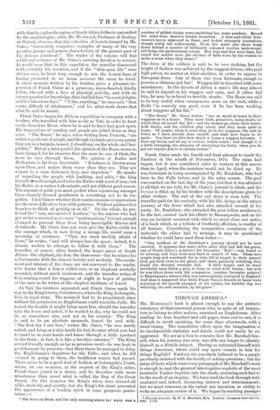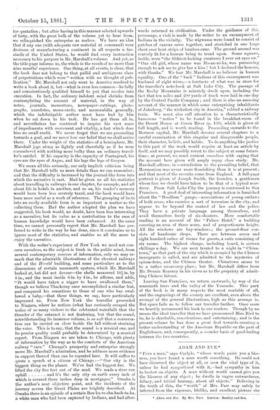THROUGH AMERICA.*
MR. MARSHALL'S book is almost enough to sap the patriotic constancy of that renowned person who, in spite of all tempta- tion to belong to other nations, remained an Englishman. After reading its four hundred and odd pages, from end to end, it is difficult to avoid speaking, for some days afterwards, with a nasal twang. The cumulative effect upon the imagination of its inexhaustible statistics and details could not easily be ex- aggerated. We are at a loss to conceive how Mr. Marshall him- self, when his journey was over, was able any longer to identify himself as a British subject. Having so saturated himself with things American, where could any space remain in him for things English P Yankees are popularly believed to be a people peculiarly endowed with the faculty of asking questions ; but the array of facts which cram every paragraph of Mr. Marshall's work is enough to cast the greatest interrogative exploits of the most insatiable Yankee inquirer into the shade, assuming each fact to be the result of an inquiry. We have read the book through with unabated and, indeed, increasing interest and entertainment ; but we must renounce at the outset any intention or ability to write an adequate review of it. We began by marking passages • Through America. By W. Q. Marshall, M.A. London : Sampson Low and Co. 1881. 1 vol.
for quotation ; but after having in this manner selected upwards of forty, with the great bulk of the volume yet to hear from, we relinquished the enterprise as useless. We have an idea that if any one (with adequate raw material at command) were desirous of manufacturing a continent in all respects a fac- simile of the United States, he would find every instruction necessary to his purpose in Mr. Marshall's volume. And yet, as the title-page informs us, the whole is the result of no more than nine months' experience. One thing, at all events, is clear, that the book does not belong to that pallid and ambiguous class of perpetrations which were "written with no thought of pub- lication." Mr. Marshall not only went to America resolved to write a book about it, but—what is even less common—he fully and conscientiously qualified himself to put that resolve into execution. In fact, the ordinary indolent mind shrinks from .contemplating the amount of material, in the way of notes, journals, mementoes, newspaper-cuttings, photo- graphs, anecdotes, menu-cards, and memorabilia generally, which the indefatigable author must have had by him when he sat down to his task. He has got them all in, :and nevertheless has contrived to inspire his vast mass of impedimenta with movement and vitality, a feat which does him no small credit. We never forget that we are proceeding towards a goal, and we never lose our belief that we shall arrive there. Under the weight of the statistics of a hemisphere, Mr. Marshall jogs along as lightly and cheerfully as if he were e3cumbered with nothing more bulky than an ordinary travel- ler's satchel. If his capacity is the capacity of Pantagruel, his eyes are the eyes of Argus, and his legs the legs of Geryon.
We mean all this seriously, our only implicit criticism being that Mr. Marshall tells us more details than we can remember ; -and that the difficulty is increased by the journal-like form into which the narrative is cast. Had he given us all his statistics about travelling in railways in one chapter, for example, and all about life in hotels in another, and so on, his reader's memory would have been less severely taxed, and the book would have been more useful as a work of reference. The grouping of facts into an easily available form is as important a matter as the collecting them. Had the author adopted the plan we have suggested, his book would, no doubt, have been less interesting -as a narrative, but its value as a contribution to the sum of 'human knowledge would have been enhanced. At the same -time, we cannot personally regret that Mr. Marshall has pre- ferred to write in the way he has done, since it constrains us to ignore most of the statistics, and enables us all the more to enjoy the narrative.
With the writer's experience of New York we need not con- cern ourselves, as the subject is fresh in the public mind, from several contemporary sources of information, only we may re- mark that the admirable illustrations of the elevated railways and of the Herald building, and some particulars as to the ,dimensions of certain mammoth oysters, which Mr. Marshall looked at, but did not devour—the shells measured 10 in. by 4 in., and the meat inside 6 in. by 4 in., he affirms, and adds, It would have taken a nigger to have swallowed them," though we believe Thackeray once accomplished a similar feat, and compared his sensations to those of one who has swal- lowed a baby,—that these things, we say, have particularly impressed us. From New York the traveller proceeded to Niagara, where he notices (what has curiously escaped the notice of so many visitors to the celebrated waterfall) that the thunder of the cataract is not deafening, but that the sound, notwithstanding its immense volume, is so soft that a conversa- tion can be carried on close beside the fall without straining the voice. This is to say, that the sound is a musical one, and its precise quality could probably be determined by a musical expert. From Niagara we are taken to Chicago, with plenty of information by the way as to the comforts of the American
-railway "cars." Chicago's prosperity and enterprise strongly move Mr. Marshall's admiration, and he adduces more evidence in support thereof than can be repeated here. It will suffice to .quote a speech of a citizen of Chicago :—" Our city is the biggest thing on the planet. We've had the biggest fire. We lifted the city five feet out of the mud. We made a river run uphill and it's the only city on earth every inch of which is covered three inches deep in mortgages." Omaha is
the author's next objective point, and the incidents of the journey across the Great Plains are brightly described. At Omaha there is an episode of a certain Box-ka-re-sha-hash-ta-ka, a white man who had been captured by Indians, and had after- wards returned to civilisation. Under the guidance of this personage, a visit is made by the writer to an encampment of Indians in the vicinity. The wigwams were found to consist of patches of canvas sewn together, and stretched in one large sheet over bent strips of bamboo-cane. The ground around was scarcely fit for a human being to tread upon. Some squaws, inside, were "the filthiest-looking creatures I ever set eyes on." "One old girl, whose name was Ho-au-ni-ka, was presuming enough to ask me to give her a kiss ! but I declined the honour, with thanks." We fear Mr. Marshall is no believer in human equality. One of the " buck " Indians of this encampment was husband of eight wives,—a foretaste of what was in store for the traveller's note-book at Salt Lake City. The passage of the Rocky Mountains is minutely dwelt upon, including the fact that ten miles and 200 yards of track were laid in one day by the Central Pacific Company ; and there is also an amusing account of the manner in which some enterprising inhabitants of Julesberg, "the wickedest city in America," robbed a railway train. We must also call attention to a characteristically humorous " notice" to be found in the breakfast-room of the Desert House at Green River (p. 139), which is given at full length, and is worth reading. Proceeding onwards to the Mormon capital, Mr. Marshall devotes several chapters to a careful examination of this singular and disagreeable people, their character, beliefs, and habits. To do anything like justice to this part of the work would require at least an article by itself, and we may possibly revert to the subject at some future time ; at present, we must content ourselves with saying that the account here given will amply repay close study. Mr. Marshall affirms, in contradiction to the prevailing belief, that Mormonism was never more flourishing than it is at present ; and that most of the recruits come from England. A full-page portrait is given of Joseph Smith, the founder, a gentleman whose face we should have taken to be that of a typical mur- derer. From Salt Lake City the journey is continued to San Francisco. A good deal of interesting information is furnished about the " Hoodlum " gangs,—associations of young outlaws of both sexes, who exercise a sort of terrorism in the city, and appear to be beyond the control of law and the police. They have a private language among themselves, and avail themselves freely of six-shooters. More comfortable reading is an account of the "Palace Hotel," a building covering an area of three acres, and of proportionate height. All the windows are bay-windows ; the ground-floor con- sists of handsome shops. There are between seven and eight hundred suites of rooms for guests, a suite consisting of six rooms. The highest charge, including board, is sixteen shillings a day. We are next treated to a night in "China- town," as that part of the city which is occupied by the Chinese immigrants is called, and are admitted to the mysteries of opium-dens, and the Chinese theatre. Chinatown seems to be a rather unsavoury place ; but Mr. Marshall differs from Mr. Dennis Kearney in his views as to the propriety of admit- ting Chinese labour.
Leaving San Francisco, we return eastwards, by way of the mammoth trees and the valley of the Yosemite. This part of the book is in many respects the most readable of all, and the engravings of the scenery are excellent, even above the average of the general illustrations, high as this average is. But space fails us to follow our traveller further. Once more we heartily recommend his book to our readers. Though by no means the ideal traveller that we have pronounced Miss Bird to be, he is charitable, conscientious, and entertaining ; and in the present volume he has done a great deal towards creating a better understanding of the American Republic on the part of Englishmen, and, consequently, a sounder basis of good-feeling between the two countries.



































 Previous page
Previous page